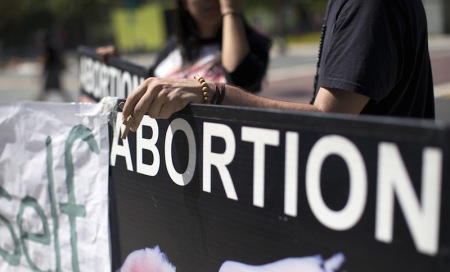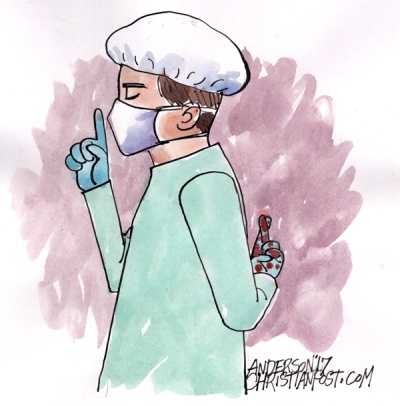New Mexico late-term abortion clinic accused of experimenting on over 500 women without consent: report

Keisha Atkins died while undergoing a late-term abortion in 2017. During a multi-day abortion procedure at Southwestern Women’s Options in Albuquerque, New Mexico, she was heavily drugged for three days before going into respiratory distress and subsequently dying from a septic infection, according to a report.
Documents released by Abortion on Trial detail some of the events that led to Atkins' death, including information about an experiment carried out by abortionists Carmen Landau and Shelley Sella involving 501 women who did not content to participate in the experiment.
The Albuquerque clinic is known for performing late-term abortions up to 32 weeks and later in some cases. Since the clinic is renowned for performing late-term abortions on viable babies in a state that has no limits on abortion, the city is frequently referred to by pro-life activists as the "abortion capital."

According to documents released by Abortion on Trial, an organization that helps post-abortive women who've suffered injuries from the procedure, Landau, Sella and staff of UCSF discussed testing the effectiveness of adding Mifepristone on late-term induction abortions.
Mifepristone, also known as RU-486, blocks the effects of the natural pregnancy hormone progesterone.
In the experiment, some 250 women, all of whom were at least 24 weeks into their pregnancy, including Atkins, were given Mifepristone. Forty-eight of the patients were minors at the time.
During the experiment that was conducted from 2016-2017, the abortionists tested whether " ... Mifepristone would make the induction abortion occur quicker and after a year of 'no perceived benefit,'" they ceased using the drug, documents show.
Some of the women who were part of the experiment suffered such things as “Hemorrhage, cervical laceration, retained placenta, and extramural delivery,” and at least seven patients were admitted to the hospital, according to the report.
Atkins, who was six months pregnant when she underwent the multiday late-term abortion procedure, was not only part of that experiment, but was also given Oxycodone, Fentanyl and Versed several times over three days. Each day she went back and forth from the clinic to a hotel room where she stayed during the evenings and wasn't monitored by medical staff during those hours.
An induction abortion takes several days and the process begins with the abortionist injecting the baby’s heart with digoxin, causing cardiac arrest. The abortionist then begins the process of cervical dilation over a period of days, and the woman leaves the clinic to stay off-site and returns days later to deliver the dead baby, according to LiveAction.
On the third day of the procedure, she returned to the clinic and was again prescribed Fentanyl, Versed, and Oxycodone. She reportedly began to suffer from labored breathing and was transported by paramedics to a nearby hospital due to “respiratory distress.” Atkins died at the hospital from a septic infection.
Fentanyl, one of the medications prescribed to Atkins, is a narcotic painkiller the CDC describes as "50-100 times more powerful than Morphine.” It's highly addictive and an overdose can be fatal. Versed is a medication that prevents a patient from having any memory of a traumatic procedure.
Induction abortions are performed in the third trimester of pregnancy when the baby is fully developed and viable. Sometimes women go into labor early and deliver at home or in their hotel rooms.
During a 2019 deposition in the case of Atkins' death, Landau said that during an emergency, the abortion clinic advises patients not to go to the hospital in an emergency, but to contact the abortion clinic staff. She insisted that emergency room doctors are "not the best qualified" to treat patients undergoing an abortion.
Jamie Jeffries, executive director of Abortion On Trial, told CP in an interview that she believes women are often manipulated by abortionists into having a late-term abortion or are coerced to believe that it's the safest medical choice for them.
“So ... we see how the women are really heavily manipulated, coerced, made to fear and the results of that is a high profit for the abortionist,” Jeffries said.
“Even though the women know they are pregnant, they are still being extremely manipulated by the person in power,” she continued. “The abortionist is the powerful one and the woman is the underdog in the situation and the abortionist really abuses their power over women who are in a position of fear and crisis.”
She further contended that abortion providers give women high levels of narcotics and will often lie to patients and tell them abortion is medically necessary for the life of the mother.
“So physically, there’s a high level of danger in these procedures, but also emotionally and spiritually the wounds that come out of late-term abortion are even greater than that of the early-stage abortion,” she said.
“These babies are survivable, and they could just as easily have been born alive. ... We have some women that were told by SWO and Dr. Landau and Dr. Boyd that if you don’t get this abortion, you’re going to die. It broke their heart, and they ultimately decided to save their own life, so they thought,” she continued.
Jeffries said the experimentation done on women having abortion procedures is for profit and medical recognition for the provider, which leads to physical, emotional and spiritual wounds for the women.
Atkins’ sister, Nicole Atkins, also suffered from a botched abortion at SWO that led to cervical lacerations, causing her to require a hysterectomy. Documents indicate that her baby’s organs, aborted at 17 weeks, were donated for research at the University of New Mexico without her consent, LiveAction reported.
“It’s really, really damaging for these girls,” Jeffries said. “Of course a baby dies and that’s awful, but these women are also dying. Keisha Atkins died. They experimented on her that week … and she died.”
Jeffries said the public doesn't realize how damaging a late-term abortion is since the women still undergo vaginal labor and delivery to a still-born child.
“The women really are being emotionally damaged from allowing themselves to make that choice,” Jeffries added. “The feelings that we hear from them a lot is, 'Why didn’t I stop them from convincing me to do that?' It was never, ‘Why did I want that? Why did I choose that?’ It was, ‘Why didn’t I realize what I was letting happen?’ And so that’s an important mentality, I think, for people to understand.”
Dr. Christina Francis, chair of the Board of American Association of Pro-Life Obstetricians and Gynecologists, told CP in an emailed statement that the abortion industry often places profits over the value of patients’ lives.
"AAPLOG believes that all women deserve the best available healthcare, and the best possible information about their care,” Francis wrote in the statement. “Unfortunately, we have repeatedly seen cases of the abortion industry putting its profit and political goals ahead of our patients' lives.
“The evidence is clear — abortions always end the life of an innocent preborn human being and they lead to significant health risks for the mother, especially when done in the second and third trimesters,” she continued. “Using Mifepristone in the second trimester has been associated with a nearly 40% rate of surgical intervention required due to the severe hemorrhage or retained tissue.
“Women who need this type of surgical intervention are at a much higher risk of complications such as uterine perforation, cervical lacerations, and preterm births in future pregnancies. Women and their children deserve better than this. They deserve fully informed consent, compassionate support in caring for their children, and to receive the best healthcare possible from qualified physicians."
Emily Wood is a reporter for The Christian Post. She can be reached at: emily.wood@christianpost.com






















